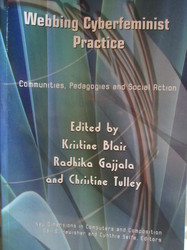I decided I might as well get one, maybe two, more Pre-Project Post in before the official day, so I read the introduction to Webbing Cyberfeminist Practice: Communities, Pedagogies, and Social Action, edited by Kristine Blair, Radhika Gajjala, and Christine Tulley with the introduction by them as well. First, let me admit that I struggle with terms like "web cyberfeminist practice" (3). I'm not sure that it is a flaw in my understanding or knowledge, just that terms like these can have multiple meanings or even have a fluidity to them that can be elusive. I will say, however, that my knowledge in this area of inquiry is quite limited. With that said, the text has a LOT to offer.
The book is laid out in three themes: 1) Forming Virtual Kinships, 2) Redrawing Academic Borders, and 3) Resisting Gendered Hierarchy. Each of these section has a wide range of essays.
There were a couple of phrases, comments, statements, that I thought were interesting. In the first section, the editors state that "this emphasis on how the personal is a necessary part of cyberfeminism practice is a theme . . ." in the essays here (4). Is that true? Do I have to divulge something personal about myself in order to participate in "web cyberfeminist practice"? Not sure I buy into that theory. Can I not perform feminist practices on the web without also being personal? I think about this blog, and I believe all I have written about are things of a professional nature, except maybe the little bit of biography that discusses some pretty vague hobbies. Are those considered personal? I don't know that they really add to what I am doing here.
That leads me to question exactly what I am doing here. I believe I'm chiseling out a place for me in cyberspace. A place where my voice can be heard. Not that it will be, people would have to read it for that be true, but it CAN be.
Another quote, dealing with an essay in the second session, argues that "gendering of cyberspace occurs at the moment when boys become the makers of technology and girls aspire to be but its users" (8). What constitutes the making of technology? Do I have to go out and invent something? Maybe I just need to be a programmer? Maybe making this site on Weebly counts as being a technology maker? To be fair, the article being discussed here is arguing that it's about education and literacy. Hard to argue with that.
The final section, about hierarchies, deals with JUST that. In the beginning of the information highway, there were pipe dreams and ideals of utopia when it came to how the internet would create a true democracy. What we have learned is that hierarchies can be recreated on the web just as they are offline. Therefore, we have to aware of these hierarchies and find ways to overcome them.
I will definitely be interested in reading several of the articles in this text. There are a couple that I will probably bypass, like the one dealing with women who have lost children and the bonds they create online, but I think the collection, overall, will be fascinating for me.

 RSS Feed
RSS Feed

